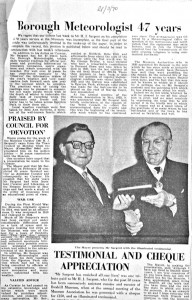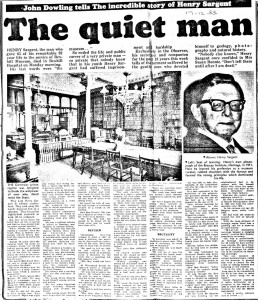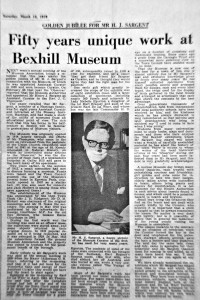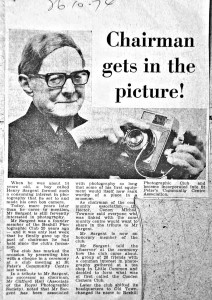Category: Conscientious Objector
Date of Birth: 20.10.1891
Date of Death: 12.12.1983
Address: St. James Road, Hastings
Photos and newspaper articles
Family Information
Henry’s Parents were:-
- John Henry Pomphrey Sargent, born in 1848, in Hastings, Sussex, and married Frances Helen Tindall, in Hastings, in 1879.
- Frances was born in 1845, in Speldhurst, in Kent, was Christened on 6th July 1845, and died in 1928, in Hastings
Henry’s siblings:-
- Beatrice Hannah Sargent, born 1881, in Hastings, and married James Fairall, in 1933, in Hastings.
- John Tindall Sargent, born in 1884, in Hastings, and married Rose L. Carr in 1914, in Hastings.
- John and Rose had two children – John C. Sargent, in 1920 and Joan H. Sargent in 1922, both in Hastings
First World War Experience
Henry James Sargent was a Conscientious Objector, who went to prison for his beliefs and suffered severe punishment throughout the whole of his time there.
Tribunals had the power to place Conscientious Objectors on the military register, as “Non-Combatants”, and, as such, they would join an Army Corps where they would have no involvement in active service or given any training in the use of weapons.
The hearings of many tribunals, however, were far from fair, with the judgments showing a lack of understanding and sympathy, where the Tribunal members were, obviously, looking upon such men as no more than cowards and worse than criminals.
In many cases, applications for exemption were turned down altogether, which meant that the men were liable for call-up as ordinary soldiers. These unwilling conscripts could then be arrested and handed over to the military where, if they disobeyed military orders, they could be court-martialled and sent to prison – and the treatment of COs in some prisons was not just unpleasant but bordered on torture; more mental than physical perhaps, but this can be a great deal worse.
Henry Sargent went before a Tribunal and, because of his beliefs, refused to undertake military service under any circumstances. His case was considered and he was given a certificate of exemption on condition that he undertook national work within twenty-one days, which condition, he fully met. Later, however, a military representative, at the East Sussex Tribunal, successfully appealed against the earlier decision of the Local Tribunal with the result that Henry was ordered to report for military service within fourteen days.
Henry offered to do any other form of work such as stretcher bearer on the front lines, anything other than take a life, which to him was far too precious. He refused to wear army uniform or carry a rifle so, one morning two policemen appeared at his front door and arrested him. He was taken to Wormwood Scrubs where he stood before a Military Tribunal, in civilian clothes, and instructed to salute the officer, which he refused to do, saying that he was a civilian. He was told to put on a prison uniform and was, then, taken to a cell with a bed but no mattress – he had to wait a fortnight for that to appear.
The treatment that Henry received at Wormwood Scrubs was, virtually, a form of mental torture – he was kept in solitary confinement, and like all other prisoners was not allowed to have a clock or a calendar so that they couldn’t tell the time or the date. He was an intelligent and an educated man, but was only allowed children’s books to read.
Some months later, he was transferred to Dartmoor Prison, where discipline was, again, very strict and the work very hard. One day, when Henry Sargent was felling trees with a gang of fellow prisoners, he collapsed under the heavy load he was being forced to carry, and this event lead to a question about Henry’s imprisonment and treatment being raised in the House of Commons.
Perhaps as a result of the raising of this question, Henry was summoned to the Governor’s office, given money for the fare and told to find his own way to Wakefield prison. Sargent later said that on that journey, after so many years of solitary confinement he had never felt so lonely or so frightened of the outside world. At Wakefield Prison, due to the report of his good behaviour at Dartmoor Prison and his poor health from the bad treatment, Henry was given work as a prison orderly, until after the war.





